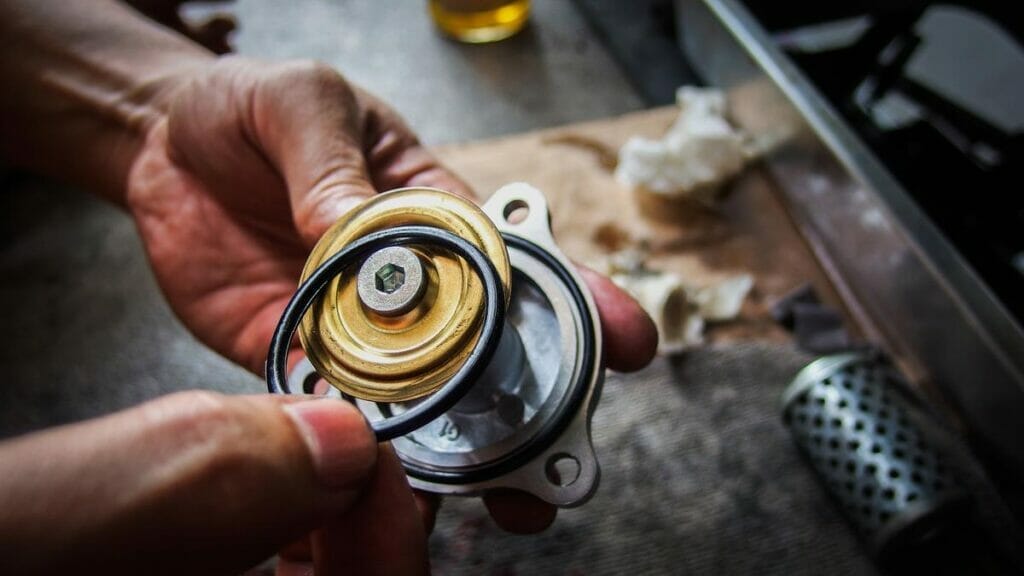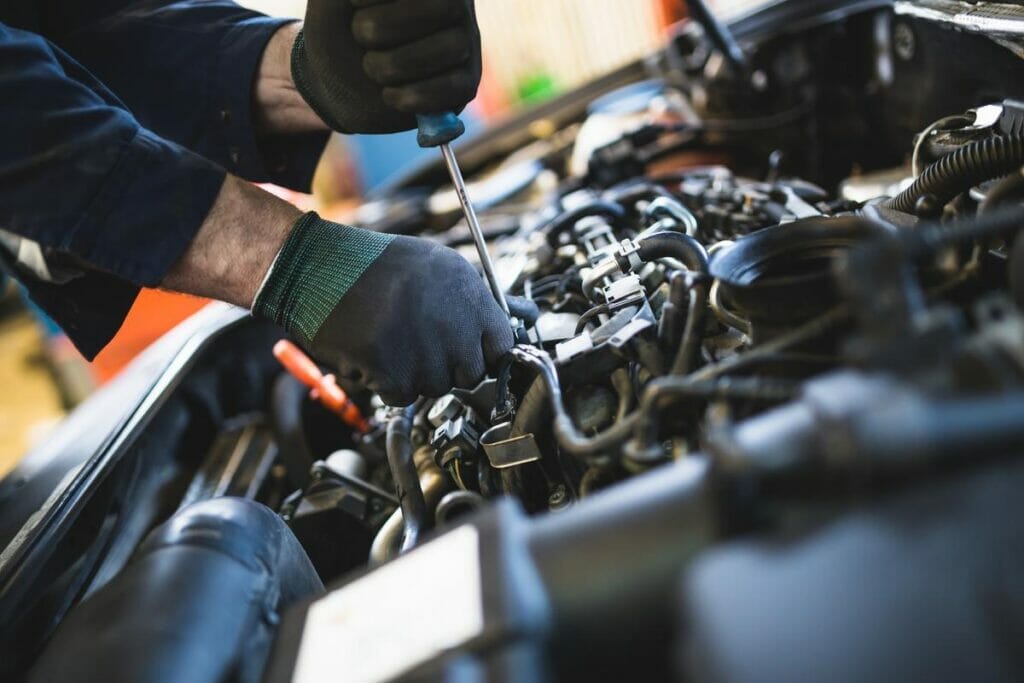Is your car making strange noises from the engine bay? It could be a failing water pump.
In this blog post, we’ll explore the various sounds a bad water pump can make, from whining and squealing to grinding and rattling. By the end, you’ll be able to identify these noises and know when it’s time to replace your water pump.

Types of Water Pump Noises
Whining, Squealing or Chirping Noise
A whining, squealing, or chirping noise from a water pump often indicates that the bearings are wearing out. The bearings are responsible for allowing the pump shaft to rotate smoothly. As they deteriorate, they can cause a high-pitched noise that may increase in volume as the pump’s speed increases. This type of noise can also be caused by a loose or misaligned belt, which can result in the pulley system not functioning correctly.
Grinding or Growling Noise
If a water pump emits a grinding or growling noise, it typically suggests that there is damage to the impeller or other internal components. The impeller is responsible for moving water through the pump, and if it becomes damaged or worn, it can cause a grinding noise as it rotates. Additionally, the presence of debris or foreign objects within the pump housing can also lead to grinding noises.
Rattling or Knocking Noise
A rattling or knocking noise from a water pump can indicate several issues, such as loose mounting bolts, a damaged impeller, or worn bearings. Loose mounting bolts can cause the pump to vibrate excessively, resulting in a rattling noise.
A damaged impeller can also produce a knocking sound as it rotates, particularly if it is hitting the pump housing or other components. Worn bearings can contribute to this issue, as they can allow the impeller to move out of alignment.
Ticking or Clicking Noise
A ticking or clicking noise from a water pump usually suggests that there is an issue with the valve system. The valves within the pump are responsible for controlling the flow of water in and out of the pump. If a valve becomes stuck, worn, or damaged, it can create a ticking or clicking sound as the pump operates.
This type of noise can also be caused by air being trapped within the pump system. Air pockets can disrupt the smooth flow of water and cause the valves to make a ticking or clicking sound. Bleeding the air from the system can often resolve this issue.

Diagnosing the Source of Water Pump Noise
Identifying the Type of Noise
The first step in diagnosing a bad water pump is to identify the type of noise it’s making. Common noises associated with a failing water pump include whining, grinding, and squealing sounds. Whining usually indicates a loose or worn-out belt, while grinding suggests a problem with the bearings. A squealing noise typically points to a malfunctioning pulley or a lack of lubrication.
Checking for Leaks
Next, inspect the water pump for any visible leaks. A leaking water pump can cause a variety of issues, including noise. Check for coolant leaks around the pump’s gasket, seals, and weep hole. If you notice any leaks, it’s likely that the water pump needs to be replaced.
Assessing the Pulley and Belt
The water pump pulley and belt are crucial components that can contribute to noise if they’re damaged or misaligned. Examine the pulley for any signs of wear, such as cracks, chips, or wobbling. Also, check the belt for fraying, glazing, or looseness. If either the pulley or belt is damaged, they should be replaced promptly.
Inspecting the Bearings
Water pump bearings can wear out over time, causing grinding or humming noises.
To check the bearings, first, ensure the engine is off and cool. Then, try to wiggle the water pump pulley by hand. If there’s excessive play or roughness when rotating the pulley, the bearings are likely damaged and need to be replaced.
Evaluating the Impeller
The impeller is responsible for circulating coolant through the engine. A damaged impeller can cause cavitation, which results in a growling or rumbling noise.
To inspect the impeller, the water pump must be removed from the engine. Look for signs of corrosion, cracks, or missing blades. If the impeller is damaged, the entire water pump assembly should be replaced.
Conducting a Pressure Test
If the source of the noise is still unclear, a pressure test can help diagnose internal issues with the water pump. This test involves pressurizing the cooling system and checking for leaks or a drop in pressure. If the pressure drops rapidly or the pump cannot maintain proper pressure, it indicates a failed water pump that needs to be replaced.
FAQs
Is a squealing noise always a sign of a bad water pump?
Yes, a water pump may make more noise when the engine is cold due to the increased viscosity of the coolant and lubricants.
How does a car act when the water pump is going out?
The car may overheat due to lack of coolant circulation. Coolant leaks may be visible under the vehicle. Squealing or grinding noises can come from the water pump. The check engine light may illuminate.
What is bad water pump sound like when accelerating?
A bad water pump may make a whining, buzzing, or squealing noise when accelerating. The noise often gets louder as the engine speeds up. It can also make a grinding or growling sound.
What is water pump noise when starting?
A bad water pump may make a grinding or squealing noise when starting the engine. The noise is caused by a failing bearing or impeller. The sound may get louder as the engine runs.
In conclusion
Identifying and resolving mechanical seal leakage is crucial for optimal equipment performance. By understanding the causes and implementing the appropriate solutions, you can prevent costly downtime and extend the life of your seals. Contact our experts today for personalized assistance with your mechanical seal needs.


